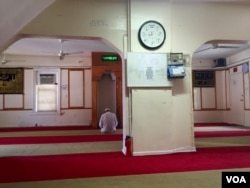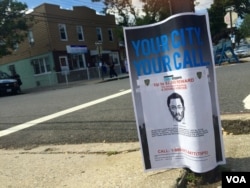The August heat stifles Ozone Park, a religiously and culturally diverse community in Queens, a New York City borough just 16 kilometers southeast of lower Manhattan.
Every few minutes, a roaring A train passes overhead on Liberty Avenue, pausing any casual conversation. Then, it's mostly silent again.
On Saturday, on the sidewalk beneath the subway tracks at Liberty and 79th streets, someone opened fire on two Muslim men — Imam Maulama Akonjee, 55, and associate Thara Uddin, 64 — killing both of the Bangladesh immigrants before fleeing the scene.
"Neighbors, friends, everybody is shocked," explained Main Uddin, joint secretary of Al-Furqan Jame Mosque, where Akonjee led prayer daily. It's three blocks from the murder site.
"Everyone likes him. He doesn't have any enemies," Uddin said. "He prays five times a day here and then he goes home."
Two days after the shooting, Uddin continues to relive the moment in his head. He had just prayed with Akonjee at 1:30 p.m. They finished at 1:45, like every other day, and went their separate ways.
"When I got home," he said, "somebody called me, ‘The imam is shot. Somebody shot the imam.'"
Fahim Opu, one of Akonjee's neighbors and a regular at the mosque, said sadness doesn't begin to describe his feelings for the imam, a teacher he called "very gentle."
"Sad, fear, everything. I am scared right now," Opu said. "In the daytime, you are not secure in this neighborhood."
Opu lives in a three-story brick building just a block from the mosque, beside a mini market on 77th Street. As he spoke to VOA, a Muslim woman in a headscarf pushed a shopping cart, passing a young boy on a hoverboard. A white woman peeked down at the sidewalk from her balcony.
Ozone Park, Opu explains, is at times peaceful, with occasional robberies at night.
But Norman, a Yemeni-native resident and mini-mart employee, says the fact that the killing took place in broad daylight is "what makes everybody crazy."
"All the time you have to worry about something," he said.
Awaiting answers
Authorities on Monday charged 35-year-old Oscar Morel of New York with second-degree murder and criminal possession of a weapon. Police indicated that the shooting may have resulted from a dispute but have not ruled out the possibility of a hate crime.
Still, Muslim residents worry about whether the killer was motivated by religious hatred, and they fear future incidents.
"I don't want to say we're getting used to" hate crimes, explained Asad Ba-Yunus, a representative of the Islamic Leadership Council of New York, "but the idea of people doing things to our houses of worship, whether it's throwing feces or sometimes firing bullets … has become a much more frequent thing."
Ba-Yunus, who attended a Sunday afternoon prayer in Flushing, Queens, told VOA the shooting has had a chilling effect on Muslims everywhere.
"While we can't necessarily say that this shooting in particular was a hate crime, or related to Islamophobia or anything like that, there's a strong sense in the community that it probably was, just because of the climate," Ba-Yunus said. "That's our first concern overall."
Community response
As the city's Muslims mourn the deaths of Akonjee and Uddin, organizations such as the Islamic Leadership Council are urging Muslim residents to be more vigilant around the mosque and their surroundings.
New York Mayor Bill de Blasio, addressing the funeral gathering Monday, called for justice for the killer of Akonjee and Uddin.
Online, volunteers set up a GoFundMe page to assist the victims' families, which reached nearly $30,000 in donations in one day. Additionally, non-Muslims nationwide joined in solidarity using the Twitter hashtag #IllWalkWithYou, vowing to walk alongside Muslims to and from their houses of prayer to help ensure their safety.
Meanwhile, at Al-Furqan, worshipers hope to fill a void left by an imam they describe as a man of peace and a good teacher. Main Uddin says it is their responsibility to keep the doors open, while honoring the man who led them.
"He says, ‘Just pray, we are Muslims. We have to show the people how we are.' So, peacefully, we have to practice our Islam. That's it," Uddin said.
Outside the building, a faded sign welcomes worshipers.
"In the Name of Allah, the Most Merciful, The Most Beneficent," it reads in both Arabic and English. Once emblazoned in bright red, white and blue, it still offers a message for everyone to see.






